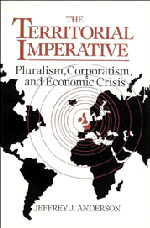Book contents
- Frontmatter
- Contents
- List of figures
- List of tables
- Preface
- 1 Introduction
- 2 Power-dependence and regional economic crisis
- 3 Central governments and regional policy
- 4 The British regions
- 5 The German Länder
- 6 The territorial imperative: Political logic interprets problem logic
- List of abbreviations
- Bibliography
- Index
2 - Power-dependence and regional economic crisis
Published online by Cambridge University Press: 26 March 2010
- Frontmatter
- Contents
- List of figures
- List of tables
- Preface
- 1 Introduction
- 2 Power-dependence and regional economic crisis
- 3 Central governments and regional policy
- 4 The British regions
- 5 The German Länder
- 6 The territorial imperative: Political logic interprets problem logic
- List of abbreviations
- Bibliography
- Index
Summary
Theories of intergovernmental relations, center-periphery relations, interest groups, and the state illuminate distinctive aspects of the politics regional decline, yet each by itself is incapable of accommodating the complex multiactor and multilevel interactions that characterize this problem area. An adaptation of the power–dependence framework pulls these approaches together in a manner that highlights their complementarity. After introducing the basic elements of the original model, I propose a modified version and then employ it to explain the emergence of pluralist, corporate pluralist, or corporatist patterns of interaction between state officials and subnational actors, and to interpret the probable political consequences that flow from these patterns.
The power-dependence framework
As developed by Rhodes over several volumes, the original framework consists of five propositions:
Any organization is dependent upon other organizations for resources.
In order to achieve their goals, the organizations have to exchange resources.
Although decision making within the organization is constrained by other organizations, the dominant coalition retains some discretion. The appreciative system of the dominant coalition influences which relationships are seen as a problem and which resources will be sought.
The dominant coalition employs strategies within known rules of the game to regulate the process of exchange.
Variations in the degree of discretion are a product of the goals and the relative power potential of the interacting organizations. This relative power potential is a product of the resources of each organization, of the rules of the game, and of the process of exchange between organizations.
This model of interorganizational relations centers on the interplay between two levels of analysis.
- Type
- Chapter
- Information
- The Territorial ImperativePluralism, Corporatism and Economic Crisis, pp. 22 - 56Publisher: Cambridge University PressPrint publication year: 1992



